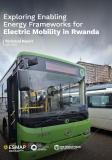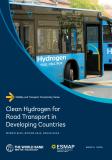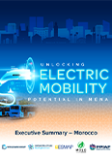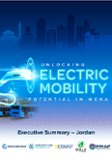Publications
Electric mobility is fundamentally changing the traditional interaction between technology, market dynamics, production capacity, government policy, supply chains, manufacturing, and complex political economy. Like many disruptive transitions, there are both opportunities and challenges. These go beyond emissions reduction and include factors such as automotive industry supply chains, jobs, market structures, trade relations between countries, electricity networks, the roles of incumbent firms, and the introduction of new competitors. Investing in technologies, modernizing power grids to accommodate more renewable energy, and putting in place the right policies are critical to scale up the uptake of eMobility.
This document is a collaboration between the World Bank’s Energy Sector Management Assistance Program (ESMAP), the World Bank Transport Global Practice, and the International Association of Public Transport (UITP) to assemble evidence, viewpoints, and analysis on electric mobility programs. The objective is to contribute towards helping governments design and implement electric mobility programs that are effective at achieving their intended development aims across climate, economic, fiscal, technical, institutional, and policy dimensions.
Patella, Dominic Pasquale; Perchel, Artur; Jaques Goldenberg, Ivan; Lee Brown, Jamie; Baker, Meredith; Joy, Oliver John E; Amato, Chiara; Steinmetz, Roland Olivier; Van der Ploeg, Roos; Breen, Evy; Koks, Zita; Aritua, Bernard; Yang, Yi - CESE1; Deng, Huijing; Beukes, Edward Andrew; Qu, Li; Hoyos Guerrero, Alejandro; Turner, Philip; Fang, Haifeng; Damasceno Ferreira Junior, Almir. 2018. Electric Mobility and Development: An Engagement Paper from the World Bank and the International Association of Public Transport. Washington, D.C.: World Bank Group. http://documents.worldbank.org/curated/en/193791543856434540/Electric-Mobility-and-Development-An-Engagement-Paper-from-the-World-Bank-and-the-International-Association-of-Public-Transport



